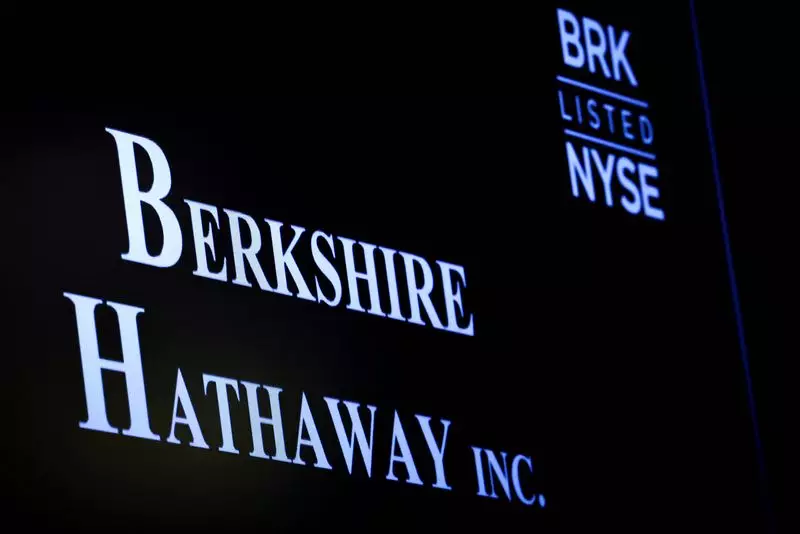In the third quarter of 2023, Berkshire Hathaway, under the iconic stewardship of Warren Buffett, continued to pivot away from stocks, highlighting a calculated strategy that has become increasingly pronounced amidst a volatile market environment. The conglomerate’s cash reserves have been bolstered to an astounding $325.2 billion, demonstrating a cautious stance that many investors will scrutinize in light of Buffett’s long-held reputation as an opportunistic investor. Notably, the recent divestiture of approximately 100 million shares, or 25%, of its holdings in Apple emphasizes this strategic retreat, with the total stock holdings now pegged around 300 million shares.
This departure from Apple isn’t merely a matter of liquidating assets; it reflects a broader trend in which Buffett has opted to sideline a key position rather than double down amidst perceived risks associated with rising taxes on capital gains. In fact, Berkshire’s net selling of more than 600 million shares of Apple in 2024 illustrates a potential shift in philosophical approach, as maintaining liquidity may be prioritized over the pursuit of immediate returns. The overwhelming liquid assets indicate Buffett’s anticipation of future investment opportunities while remaining cautious about the current economic climate.
Despite navigating a complex operational landscape, Berkshire Hathaway reported a 6% dip in quarterly operating profit to approximately $10.09 billion, clearly indicating that while certain arms of the business remain robust, broader issues have undermined performance. The substantial loss tied to insurance underwriting—including significant figures related to Hurricane Helene—has generated considerable headwinds for the conglomerate. High claims and subsequent losses totaling $565 million from Hurricane Helene signal that the insurance sector is experiencing strain, diminishing overall profitability.
Interestingly, while the general operational results reflect challenges, some segments remain resilient. For instance, Berkshire’s subsidiary Geico has witnessed a surge in underwriting profit, showcasing improvement in its claims process despite the challenges posed by the broader industry trends. Additionally, BNSF railroad operations exhibited growth, capitalizing on increased consumer goods shipments, a potential beacon of hope amid other declining sectors.
Berkshire’s reported net income of $26.25 billion—notably an increase from a loss the previous year—should be interpreted with caution, as it is significantly influenced by stock market volatility. Buffett himself has historically warned against placing too much weight on these figures, advocating for a focus on operating performance rather than unrealized investment gains or losses. This perspective underscores a fundamental philosophical approach for investors looking to follow in Buffett’s footsteps, emphasizing the importance of fundamental value over fleeting market trends.
As the conglomerate navigates these waters, it is also contending with the implications of external economic conditions, such as a strengthening U.S. dollar, which further complicates the landscape for international operations. The anticipated losses from Hurricane Milton serve as a reminder that unpredictable external forces can inflict substantial damage on profits, revealing the volatility that accompanies the insurance business model.
At the helm for well over half a century, Warren Buffett, now 94, is slowly transitioning responsibilities to Vice Chairman Greg Abel. This strategic handover carries strategic implications for the company’s long-term vision and investment strategies. Market analysts and investors will keenly observe how Abel’s leadership reflects changes to Buffett’s legacy, particularly how his approach might differ when navigating tumultuous economic terrains.
Berkshire Hathaway’s diversified portfolio—spanning from dairy products to manufacturing—continues to present a stabilizing force, offering a buffer against fluctuations in the stock market. Nonetheless, maintaining relevance and value amid changing market dynamics will be pivotal in the years to come. As Buffett himself has often said, “In the business world, the rearview mirror is always clearer than the windshield,” underscoring the importance of looking forward and adapting to the inevitable changes of capitalism.
Berkshire Hathaway is exemplifying a cautious yet strategic navigation through uncertain financial waters, marked by a retrenchment of stock holdings and an emphasis on cash liquidity. Stakeholders will be watching closely, uncertain yet eager to discern whether this is a prudent safety measure or a sign of underlying troubles ahead.

